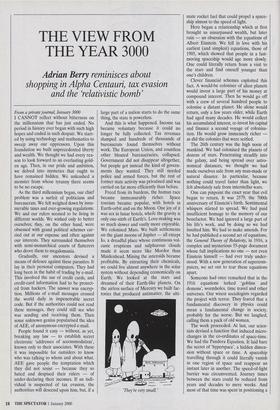THE VIEW FROM THE YEAR 3000
Adrian Berry reminisces about
shopping in Alpha Centauri, tax evasion and the 'relativistic bomb'
From a private journal, January 3000 I CANNOT reflect without bitterness on the millennium that has just ended. No period in history ever began with such high hopes and ended in such despair. We start- ed by using technology and mathematics to sweep away our oppressors. Upon this foundation we built unprecedented liberty and wealth. We thought we had every rea- son to look forward to an everlasting gold- en age. Then, in our pride and ambition, we delved into mysteries that ought to have remained hidden. We unleashed a monster from whose tyranny there seems to be no escape.
As the third millennium began, our chief problem was a surfeit of politicians and bureaucrats. We felt weighed down by innu- merable taxes and ever-growing regulations. We and our rulers seemed to be living in different worlds. We wished only to better ourselves; they, on the other hand, were obsessed with grand political schemes car- ried out at our expense and often against our interests. They surrounded themselves with semi-monarchical courts of flatterers who drove them to megalomania.
Gradually, our ancestors devised a means of defence against these parasites. It lay in their personal computers. They had long been in the habit of trading by e-mail. This involved the use of credit cards, and credit-card information had to be protect- ed from hackers. The answer was encryp- tion. Millions of e-mail messages crossed the world daily in impenetrable secret code. But if the authorities could not read these messages, they could still see who was sending and receiving them. Then some unknown genius popularised the idea of AEE, of anonymous encrypted e-mail.
People found it easy — without, as yet, breaking any law — to establish secret electronic 'addresses of accommodation', known only to their associates. With these it was impossible for outsiders to know who was talking to whom and about what. AEE gave people the temptation which they did not resist — because they so hated and despised their rulers — of under-declaring their incomes. If an indi- vidual is suspected of tax evasion, the authorities will descend upon him, but, if a large part of a nation starts to do the same thing, the state is powerless.
And this is what happened. Income tax became voluntary because it could no longer be fully collected. Tax revenues slumped and hundreds of thousands of bureaucrats found themselves without work. The European Union, and countless other bloated bureaucracies, collapsed. Government did not disappear altogether, but people got instead the kind of govern- ments they wanted. They still needed police and armed forces, but the rest of former state activity was privatised and was carried on far more efficiently than before.
Freed from its burdens, the human race became immeasurably richer. Space tourism became popular, with hotels in Earth-orbit and on the Moon. One joy of it was sex in lunar hotels, whefe the gravity is only one-sixth of Earth's. Love-making was so much slower and vastly more enjoyable. We colonised Mars. We built settlements on the giant moons of Jupiter — all except lo, a dreadful place whose continuous vol- canic eruptions and sulphurous clouds made it seem more like Mordor than Maidenhead. Mining the asteroids became profitable. By extracting their chemicals, we could live almost anywhere in the solar system without depending economically on Earth. We looked at the stars and dreamed of their Earth-like planets. On the airless surface of Mercury we built fac- tories that produced antimatter, the ulti- `They're very small.' mate rocket fuel that could propel a space- ship almost to the speed of light.
Here began a relationship which at first brought us unsurpassed wealth, but later ruin — an obsession with the equations of Albert Einstein. We fell in love with his earliest (and simplest) equations, those of 1905, which showed that people in a fast- moving spaceship would age more slowly. One could literally return from a visit to the stars and find oneself younger than one's children.
Clever financial schemes exploited this fact. A would-be coloniser of alien planets would invest a large part of his money at compound interest. Then he would go off with a crew of several hundred people to colonise a distant planet. He alone would return, only a few years older, while Earth had aged many decades. He would collect his accumulated interest, re-invest his capital and finance a second voyage of colonisa- tion. He would grow immensely richer as did the colonies that were settled.
The 26th century was the high noon of mankind. We had colonised the planets of dozens of stars. Penetrating steadily into the galaxy, and being spread over astro- nomical distances, we thought we had made ourselves safe from any man-made or natural disaster. In particular, because nothing could travel faster than light, we felt absolutely safe from interstellar wars.
One can pinpoint the exact year that evil began to return. It was 2579, the 700th anniversary of Einstein's birth. Sentimental whispers started to spread. We had paid insufficient homage to the memory of our benefactor. We had ignored a large part of his life's work, and by doing so we had insulted him. We had to make amends. For he had published a second set of equations, the General Theory of Relativity, in 1916, a complex and mysterious 55-page document whose full implications no one — not even Einstein himself — had ever truly under- stood. With a new generation of supercom- puters, we set out to tear these equations apart.
Someone had once remarked that in the 1916 equations lurked 'goblins and demons', wormholes, time travel and other universes. Our wisest sociologists regarded the project with terror. They feared that a fundamental discovery in physics could mean a fundamental change in society, probably for the worse. But we laughed, calling them a pack of old women.
The work proceeded. At last, our scien- tists devised a function that induced micro- changes in the co-ordinates of space-time. We had the Pandora Equation, It laid bare the secret of 'hyperspace% a hidden dimen- sion without space or time. A spaceship travelling through it could literally vanish in one region of space and reappear an instant later in another. The speed-of-light barrier was circumvented. Journey times between the stars could be reduced from years and decades to mere weeks. And most of that time was spent in positioning a ship for the 'jump' through hyperspace.
What foolish optimism greeted this dis- covery. 'Darling, isn't it marvellous,' said a fashionable lady, 'I can nip over to Alpha Centauri and do my Christmas shopping!' But if shoppers could make instantaneous journeys, so also could fleets and armies. The behaviour of mankind deteriorated almost overnight. Here was the chance to settle old grievances. Politicians returned. But because high politics had not been practiSed for four centuries, its subtler arts were forgotten. Leaders wanted only to seem valiant and heroic. They created an atmosphere of hysteria and extremism in which to be a moderate was to be deemed a traitor.
What began as mere play-acting soon became earnest. Hyperspace enabled interstellar wars to be fought. Humans were like children who had long been kept under strict discipline, but were suddenly allowed to do whatever they liked. One could seize other people's property and slaughter them when they objected. Each planet, hitherto merely a place to live and work, became a 'nation', with its 'honour'. Bureaucrats reappeared, this time in uni- forms and polished boots. They liked large offices with marble floors, not because the marble was elegant but because it was ideal for strutting and stamping. The hyperspatial radio waves echoed with belli- cose rhetoric: 'faithful to our destiny', 'will not be intimidated', and 'scrap of paper'.
There followed a century and a half of senseless and bloody wars. Tens of billions perished through acts of malice and revenge. At length humanity became exhausted from the slaughter, and a warlord arose who was more intelligent than the rest. His brief career was a glimmer of light in the gathering darkness. A brilliant soldier, adept at fighting battles by emerging from hyperspace where he was least expected, he was also a statesman. He made it his life's aim to halt the perpetual warfare. Having established the shell of an interstellar imperium amid the ruins of civilisation, he adopted the title of 'Peacekeeper'.
He was also a skilled journalist. One of his hyperspatial broadcasts included this passage: 'Would that the Pandora Equa- tion had been discovered 500 years earlier, before the first starship was built! Then it would have had a happier name. Hyper- space in the 21st century would have had no military function since there would have been no one to use it against. It would have been used only for peaceful expansion. The equation cannot be unmade. But it is not too late to use it as it should have been used, to build a peaceful empire, not just among the few scores of planets we have so far colonised, but among the undiscovered tens of millions that lie beyond them.'
But this was not to be. The Peacekeeper was murdered by jealous subordinates who murdered also his dream. He had been tal- ented and ruthless; they were merely ruth- less. They saw no need for a wider empire; they were content to rule what they had inherited, and they ruled — and still rule — it by violence and terror. Any world that incurs their displeasure they attack with a 'relativistic bomb'. This fearsome weapon is an unmanned spacecraft weigh- ing no more than 20,000 tons. It has no explosive warhead; it is its own warhead. For it is made to strike an offending planet at more than 90 per cent of the speed of light. Because the kinetic energy released by such a missile equals its mass multiplied by half the square of its speed, all life is obliterated.
It was said by one who visited a 'pun- ished' world a few months after such an impact that the only sign of its vanished humanity was the 'smell of millions of car- bonised human beings'. We live in daily fear of our imperial tyrants. Our only plea- sure is rereading Gibbon's The Decline and Fall of the Roman Empire and hoping that history will repeat itself.
Adrian Berry is consulting editor (science) of the Daily Telegraph. His latest book, The Giant Leap: Mankind Heads for the Stars, is available for £16.99 (np £18.99), post-free in the U.1( through the Spectator Bookshop. To order, please call 0541 557 288.



















































 Previous page
Previous page